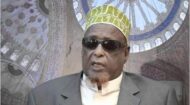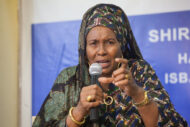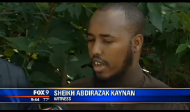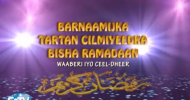June 15, 2015 | Posted by admin
I would that my life remain a tear and a smile
A tear to unite me with those of broken heart
A smile to be a sign of my joy in existence
The life of a flower is longing and fulfilment
A tear and a smile
The life of clouds is a parting and a meeting.
A tear and a smile.
—Khalil Gibran
Upon learning my friend Said’ untimely death, I could not help but shed a tear or two for I feel diminished by his death. For me his untimely death was memento mori.
As Aristotle put it: A friend is a second self so that our consciousness of a friend’s existence…makes us more fully conscious of our own existence.
When Said died, part of me died along with him for as John Donne had observed:
No man is an island
entire of it self
every man is a piece of the Continent
Each man’s death diminishes me
For I am involved in mankind
Therefore, send not to know
For whom the bell tolls
It tolls for thee.
Every Somali, every friend of his, is diminished by his untimely Death.
Said exemplified the best of what it means to be Somali. In his analysis and depiction of the Somali character, Said did not pull any punches; he was guided by this dictum of Thomas Hardy: If way to the better there be, it exacts a full look at the worst. And in looking and examining us, he took our measure by holding as ’twere the mirror up to our nature without flinching and told us what we were borrowing the Sayyid’s immortal words for the occasion:
Musuq-maasuq Soomaali waa meheradeediiye
Hadba midab horlay kuula iman maalin iyo layle
Malahmalahda iyo baanaha mowdku ka adeegay:
Dissembling is the Somalis’ inveterate habit
They come to you every day and night
With new colour
Oh! Death to duplicity and bluster.
We Somalis say:
Since you are not going to live forever
Leave behind you
as a legacy
some wisdom
some word
some wit
some bonbons
some bon mots!
And Said had indeed left us some legacy, some wit, some word, some wisdom, some bonbons, some bon mots that outlive him, that are now tickling Death’s ear!
In his opus, in his magisterial study of the Sayyid: Oral Poetry and Somali Nationalism: The case of Sayyid Mohammad ‘Abdille Hassan, Said drew an unforgettable picture of the Mad Mullah who kept the British out of Somalia for over two decades by employing in the words of Margaret Laurence: The Poem & the Spear.
And throughout his lifetime of battling, she added, he employed what must surely be the strangest of all military weapons—poetry.
He boasted: Allah taught me the art of acrimony & abuse … done with proper style! And he bade the Somali people: hold fast to my noble utterance / lest thou perish. And many of the Somali nation have committed his immortal verse to memory.
And the British were hellbent on their mission of what Conrad called in his Heart of Darkness: The conquest of the earth, which mostly means the taking it away from those who have a different complexion or slightly flatter noses than ourselves, is not a pretty thing when you look into it too much.
Margaret Laurence wrote in The Poem & and The Spear , in her study of the Sayyid: I was making some attempt not only to tell the Sayyid’s story but also to understand the plight of of a tribal people faced with imperialist opponents who do not posses superior values, but who have greater material resources and more efficient weapons of killing.
The Sayyid was as stubborn as the British whom he wrote:
I have sought and found the Prophetic guidance/[which appointed me] to tell [you] unbelieving white invaders: / “This land is not yours”.
I wish to rule my own country and protect my own religion. If you wish war, I am happy; if you wish peace, I am also content. But if you wish peace go away from my country to your own!
I wish to rule my own country and protect my own religion. If you wish war, I am happy; if you wish peace, I am also content. But if you wish peace go away from my country to your own!
Kingsmill saw the imagination and the will as contending impulses, and he liked to recall an inscription on a stone found in North Africa: ‘I, the Captain of a Legion of Rome, serving in the desert of Libya have learnt and pondered this truth: “There are in life but two things, Love and Power, and no one has both.”
Said speaks of the Sayyid as he was. Extenuating nothing
Nor did Said set down aught in malice as he spoke of one that loved Power too well and not wisely and oppressed Somalis who did not agree with him or with his brand of Islam: he was ur-Al-shabaab; ur-Islamic State, ur-Osam bin Ladn!
Finally as Isma’iil Mire had noted the Sayyid was done in by his own Hubris:
O men, pride brings disaster: let that be remembered!
Finally, the judgment of The Isaaq poet, Jeeni- ‘Ade on the Sayyid is incontrovertible :
He made a damning comparison between the [Sayyid’s} Dervish government and that of the English, maintaining that life under a Christian ruler was infinitely preferable to the bloody anarchy of the Sayyidcharacterizing the Sayyid thus:
Of water, the reliable is trickle is better than the untested gush of the fount,
An obedient wench is better than an intemperate woman of class;
And an unyielding camel which supports her suckling
Is better than a mean-tempered camel of much milk
And an adversary is better than a kinsmen who abandon fellow kin.
It is better to have none than to be afflicted win in-laws of bad manners,
Better than a murderous Muslim is a Christian who protects your woman and child!
And what now of my friend Said Sheikh Samatar who is telling me from the grave:
Togane
Remember
When we were in that misty mystical mescal mood
and I told you
If thou didst ever hold me in thy heart
Absent thee from felicity a while,
And in this harsh world draw thy breath in pain
To tell my story
Togane
Set you down this,
That I am
Of one whose hand,
Like the base Indian threw a pearl away
Richer than all his Laylkasse clan
Of one whose subdued eyes
Albeit unused to the melting mood
Drop tears as fast as the Arabian trees
Their medicinal gum
Togane
Set you down this:
I have fought a good fight
I have fought a good fight
I have finished my course
I have kept the faith.
—Mohamud Siad Togane
COMMENTS

 All Posts
All Posts









